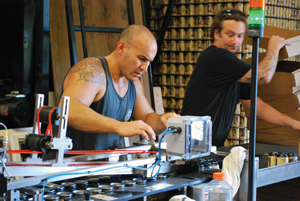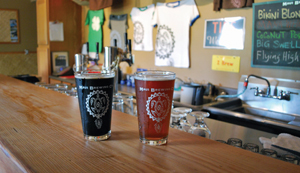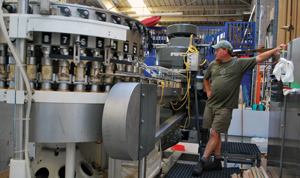By Eli Raffeld
Garrett Marerro and Malanie Oxley founded Maui Brewing Company in 2005. It has quickly become Hawaii’s largest craft brewery and has won numerous awards including medals at the Great American Beer Festival and the World Beer Cup. With the addition of head-brewer Scott Freitas (Deschutes Brewing, Wild Duck Brewing) in 2008, Maui’s beer portfolio has developed into a robust collection of suds. Located in Lahaina, Maui, with a brewpub six miles up the road in Kahana, Maui Brewing harnesses an island philosophy and tropical ingredients, yielding beers of paradise.
I had the pleasure of sitting down with Garrett Marerro at his Lahaina brewery to interview him about his vision, brewery and brand.
What’s the meaning behind “Brewed with Aloha?”
“Brewed with Aloha” is kind of a state of mind. Aloha is a spiritual thing more than a physical thing. It means brewed with love and respect. Within our company, besides the natural methods and processes we use (free of chemicals, filtration and preservation or pasteurization), we believe in the natural naked state of things. The beer and food that we serve at our pub, begins with the spirit of the guy producing the beer. If you have a bad attitude it will come across in the product.
Something that we always like to say is, remember we are brewing beer in Hawaii and this is a fun thing. It gets stressful, but you always need to remember why you are doing something, not just what you are doing.
Handcrafted ales and lagers brewed with aloha really define us. It is our version of Sam’s (Sam Calagione, Dogfish Head) “off centered ales for off centered people” or Stone’s “you’re not worthy.” Great friends of mine on both sides, but we can’t say “you’re not worthy,” because that’s not aloha. We can’t do “off centered,” because we are more middle market. We have people here from all over the world. When someone opens one of our beers, part of what they notice is the label… the integrity of the label is authentic. Our beers are sexy to look at and even more sexy to drink. We want you to think, ‘I’m on vacation’ every time you’re drinking a bikini blonde lager.
What problems do you face when sourcing ingredients?
We have no amber waves of grain on Haleakalā, meaning we have to bring in malt from all over. Beyond malt not being grown here, it’s not processed here either. So we don’t have malting houses, we don’t have hop processing; we have planted hops before, but we don’t get a producing hop vine because it doesn’t frost here. We used 24,000 pounds of hops last year. To produce that much would be an insane amount of acreage, and dirt is extremely expensive. We do have challenges for containers scheduled to arrive at a certain time or day. There may be a storm at sea, a delayed ship, a container falls off, etc… So we may have planned on brewing bikini blonde but we are out of pilsner malts… so we’re going to have to brew something else. Especially with the recent natural disaster, we can’t work, there’s no water, we’re uncertain about the power, people can’t get to the brewery.
On an island you can’t be so stuck on Monday through Friday 9-5. Most brewers can call a malt distributor and the next day they’re filling the silo, but here we have to put redundancies in place so that we can have a back up plan. You really have no next day shipping, to the point where I have flown to different islands, and flown people in from the mainland carrying a piece of equipment if need be. On the island we learn if the store is out of something, it’s just out. It’s part of the way of life–a slower pace. You can’t really have this high-pressure pace of life.
Why do you use cans and what is this micro-canning revolution?
The “Micro-canning Revolution,” as Dale at Oscar Blues Brewery dubbed it (I call him the granddad of the micro-can revolution), has taken off. When we started we were the 11th brewery. Now there are over 100. Even Sierra Nevada is looking at cans. We just sold our old canning line to Arcadian, who bottled for over 14 years. The revolution is here to stay. At some point it will be not much of revolution because it will be the norm. Cans protect beer from light, reduce oxidization, and don’t allow oxygen ingress. The can seals the beer in the way that the brewer intended. In Hawaii, you can’t get glass bottles, there is a heavy tax on glass, glass bottles on beaches are not a friendly idea, the weight to ship them is not efficient. We can ship 2000 cases of cans in a container, where in the same footprint we would be shipping only 1200 cases of bottles. The cans are made locally with local labor, over on Oahu, then shipped to us and we fill them in Lahaina, helping to support the local economy.

What differentiates Maui Brewing Co. from other Hawaiian breweries?
First we want to pay respect to a brewing company that is producing and packaging beer here: Hawaii Nui Brewing Company, the other 100% local brewery. Two years ago we were the only ones making craft beer on Hawaii.
What differentiates us from Kona Brewing Company is that we actually make the beer that we tell you is from Hawaii in Hawaii. Not a single drop of Kona beer that you drink in Japan is made in Hawaii. Kona’s Aloha series of beers, interestingly enough, including a coconut stout, is made to look Hawaiian, but it’s not Hawaiian at all. The company is not based here anymore. They haven’t bottled here since 2003.
We believe our beer is better. Because of that, we have now become the largest brewery in the state of Hawaii. Kona will argue that they are larger, because they brew more beer worldwide. But when most of your production comes from outside the state of Hawaii, sorry bro you’re not Hawaiian. It’s not local.
As long as I’m alive, our beer will always be brewed in the state of Hawaii. We want to be authentic. If there comes a point where we want to grow to the next level, and that level does not allow us to brew in Hawaii, we will either not grow or diversify into other product lines and open up more pubs. We certainly will not sacrifice our integrity for small extra growth or significant extra profit by deceiving the public; that’s just not in our spirit. That would not be brewing with aloha, that would be brewing with deceit, and we believe that deceit tastes like crap.
Do you have a message for drinkers in Japan?
We like to say Okolemaluna! Proust! Bottoms up! Here in Hawaii we drink a good amount of beer on the beach. When people drink a can of Maui brew in Japan, we hope they are transported to Hawaii and have the warm feeling of Aloha for at least that 12 oz, or 16oz. Please come visit us because we have a lot more beers that never make it off the island. Aloha!
Cans and kegs from Maui Brewing are available from Nagano Trading.
Parting anecdote:
Maui Brewing’s former assistant brewer Daniel was once in charge of roasting coconuts for their Coconut Porter. After long days of roasting, he would try to relax at local bars, but women, smelling the intoxicating aroma of freshly roasted coconuts, would inevitably swarm him. After Daniel left the company to start a new life with his new bride, there was great upheaval at Maui Brewing as to who was next in line to roast the coconuts…and attract all the women.


Scott Freitas
This article was published in Japan Beer Times # () and is among the limited content available online. Order your copy through our online shop or download the digital version from the iTunes store to access the full contents of this issue.



